Staying Well While Staying at Home
A Guide for Cancer Patients and Their Caregivers and Family Members
COVID-19: What Older Adults Need to Know
If you are one of the people at increased risk for serious COVID-19 illness because of a cancer diagnosis, it’s especially important for you to take action to reduce the risk of getting COVID-19 now. This video offers tips to help you prepare to stay home for a few weeks if you have to.
These tips can help cancer patients, as well as their family members and caregivers, stay healthy while staying home.
Cancer Patients and Survivors
If you have cancer now or had cancer in the past, you may need to take special steps to protect your health if you have to stay home. This is especially important for cancer patients who are treated with chemotherapy. They are more likely to get an infection because chemotherapy can weaken the immune system, and for the same reason the infection may be more severe.
- Watch out for fever. Take your temperature any time you feel warm, flushed, chilled, or not well. Call your doctor right away if you have a temperature of 100.4ºF (38ºC) or higher.
- Clean your hands. Many diseases are spread by not cleaning your hands, which is especially dangerous when you’re getting chemotherapy treatment. Wash your hands often.
- Know the signs and symptoms of infection. Infection during chemotherapy can lead to hospitalization or death. Call your doctor right away if you notice any of the signs and symptoms of an infection.
- Avoid other people as much as possible (social distancing). Avoid leaving home as much as possible. Maintain a distance of at least 6 feet (2m) between you and non-household members. If you must leave home, avoid places where people congregate. Have supplies and food delivered to your home.
Caregivers, Family Members, and Others
It’s also very important for people who live with or take care of people with cancer to take steps to keep themselves healthy. As a caregiver, it is important for you to take care of yourself. All of your actions will impact your loved one’s health and well-being. Following the proper protocol is essential to help lower the chance of spreading an infection to the person with cancer.
Caregivers and household members must remember that if they become infected with COVID-19, they risk infecting the cancer patient. Therefore, in order to minimize their risk of becoming infected, they should observe the precautions recommended for the cancer patient as much as possible.
- Watch out for symptoms of infection: fever of 100.4ºF (38ºC) or higher, cough, or shortness of breath.
- Clean your hands often.
- Avoid other people as much as possible (social distancing). Avoid leaving home as much as possible. Maintain a distance of at least 6 feet (2m) between you and non-household members. If you must leave home, avoid places where people congregate. Have supplies and food delivered to your home.
- If a caregiver becomes ill: Immediately separate yourself from the cancer patient. If possible, stay away from the cancer patient’s home. If you must remain in the same household, isolate yourself in a separate room, if possible with a separate bathroom. Make arrangements for someone else to care for the cancer patient.
Cancer Patients: Preparing for Your Medical Needs
If you’re a cancer patient, you may need medicine or special medical equipment. You may also have doctor’s appointments scheduled.
- Ask your doctor about getting extra necessary medications to have on hand in case you need to stay home for a long time.
- Be sure you have over-the-counter medicines to treat fever and other symptoms in case you get sick.
- Call your doctor’s office several days before an appointment to make sure the doctor can still see you at that time.
- If you have cancer that is responding well to treatment, talk to your doctor about your chemotherapy schedule, and only consider delaying treatments after consultation with your doctor.
Cancer Patients, Caregivers, and Household Members
Preventing the Spread of Infections
The best way to prevent an infectious illness is to avoid being exposed to germs. Some simple steps you can take to protect yourself and others while you’re at home include—
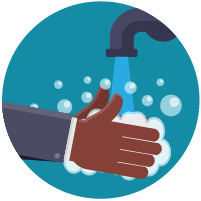
Clean your hands often
Wash your hands often with soap and water for at least 20 seconds. If soap and water aren’t available, use a hand sanitizer that contains at least 60% alcohol.
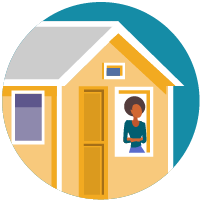
Avoid close contact with others
Stay at least 6 feet (2m) away from other people. Don’t visit crowded places; have food and supplies delivered to you. If you’re getting chemotherapy, stay away from all others as much as you can.
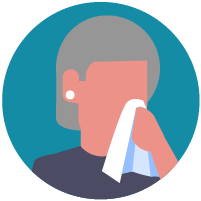
Cover coughs and sneezes
Cover your mouth and nose with a tissue when you cough or sneeze, or use the inside of your elbow. Throw away used tissues and wash your hands.
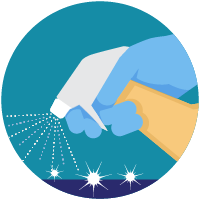
Clean and disinfect daily
Every day, clean and disinfect surfaces that are touched often, like tables, doorknobs, light switches, countertops, handles, phones, toilets, and faucets.
If You Get Sick
If you get a fever or other symptoms of an infection, take these important steps right away—
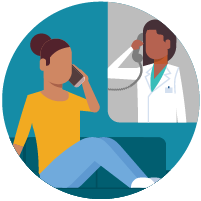
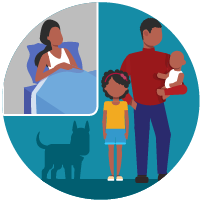
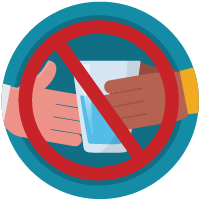
Call before going to the doctor
Before going to a doctor or hospital, call and tell them your symptoms, especially if you have a fever. Be sure to tell them if you’re getting chemotherapy.
Separate yourself from others
Try to stay in one room and away from other people in your home. Use a separate bathroom if one is available.
Avoid sharing personal items
Don’t share dishes, drinking glasses, cups, utensils, towels, or bedding with others. After using these items, wash them thoroughly.





















.png)












No hay comentarios:
Publicar un comentario